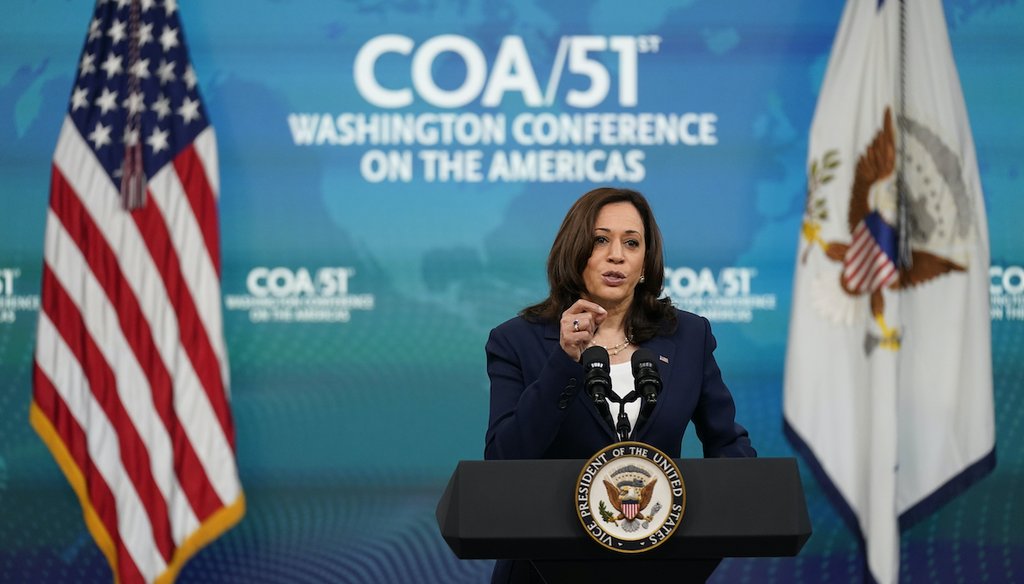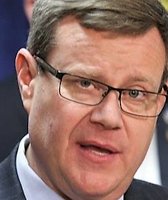Stand up for the facts!
Our only agenda is to publish the truth so you can be an informed participant in democracy.
We need your help.
I would like to contribute

Vice President Kamala Harris delivers remarks to the Washington Conference on the Americas from the South Court Auditorium on the White House campus in Washington, May 4, 2021. (AP)
Kamala Harris said corruption costs as much as 5% of the world's GDP. That stat is questionable
If Your Time is short
-
Harris was citing a figure that’s been popularly used for more than a decade. But its source is obscure.
-
Anecdotal evidence would suggest that the 5% estimate is not that far off the mark, "but we don't have solid research to confirm that," an expert told us.
For more than a decade, an interesting statistic about the cost of corruption has been bouncing around the global-economics community, showing up in statements and reports from organizations like the United Nations and the World Economic Forum.
Most recently, it came out of the mouth of Vice President Kamala Harris.
"Around the world, we know that corruption inhibits shared prosperity," Harris said May 4, at a conference on the Americas, where she touted the Biden administration’s plans to address the root causes of immigration. "In fact, the global cost of corruption is as much as 5% of the world's GDP."
"Five percent," she repeated for emphasis.
How accurate is that number? When we went to check it, we couldn’t really tell. It turns out that while it’s an often-cited statistic, no one could tell us where the estimate ultimately comes from, or what data or research was used to come up with it.
Sign up for PolitiFact texts
The White House told PolitiFact that Harris was citing data previously shared by United Nations Secretary-General António Guterres. In December 2018, to commemorate International Anti-Corruption Day, Guterres issued a statement that said, in part: "The World Economic Forum estimates that the cost of corruption is at least $2.6 trillion — or 5% of global gross domestic product."
Guterres also mentioned the 5% in September 2018 during a meeting with the U.N. Security Council, according to U.N. meeting notes. Neither the statement nor the meeting notes link to a report on that 5% estimate or include footnotes about it.
We reached out to the U.N. and to the World Economic Forum for details. The U.N. did not respond, and the World Economic Forum told us to contact the U.N.
We also reached out to organizations that published a 2008 report titled, "Clean Business is Good Business: The Business Case against Corruption." That report had a "Facts & Figures" section that also included the 5% estimate.
Gary Kalman, director of the U.S. office of Transparency International, an organization that co-authored the 2008 report, told us that his office has backed away from using the figure in recent years, because they are not exactly sure of its provenance or what methodology was used for the estimate.
"I don't know that it's wrong," Kalman said. "I just can't prove that it's right."
Anecdotal evidence would suggest that the 5% estimate is not that far off the mark, Kalman said, "but we don't have solid research to confirm that."
"I think people have used that figure over the last 10 to 15 years because it came from credible sources," Kalman said. "But the more people look into it, the more they back away from that figure."
The 2008 report cited the World Bank as the source of the facts and figures.
Jim Anderson, a lead governance specialist at the World Bank, told PolitiFact that the statistic "has been circulating for some time, but we are unaware of the specific source." Anderson provided methodology details for another statistic in the report, which said that over $1 trillion is paid in bribes each year. The bribery figure was in a paper prepared by researchers at the World Bank Institute in 2005, he said.
Matthew C. Stephenson, a professor at Harvard Law School, wrote a blog post in 2016 arguing that "it’s time to abandon" the popular line that corruption costs about $2.6 trillion, or about 5% of the global GDP. (Harris’ statement didn’t include the dollar figure.)
Stephenson, whose expertise includes anti-corruption law, wrote that he had not been able to find a definitive source for the corruption-cost estimate but offered his best guess as to where it came from. He believed that someone had misread studies, including the 2005 World Bank paper, about the volume of money laundering, and then did their own calculations related to the global GDP cost. (Here’s Stephenson’s detailed explanation.)
"If something like that is indeed what happened, then the $2.6 trillion/5% of GDP figure is completely, totally, and utterly bogus — a made-up number based on a misreading, and possibly a mistranscription, of an estimate of something entirely different: the amount, not the cost, of worldwide money laundering, not worldwide corruption," Stephenson wrote.
A paper published last month, co-authored by Stephenson, reviewed 10 of the most widely cited statements about corruption and included among them the claim: "Corruption costs the global economy approximately US$2.6 trillion, or 5% of global GDP, each year." The paper said that the claim’s source is "obscure" and its validity "unfounded."
This statistic — cited by the U.N. and other reputable organizations — "appears to have no basis whatsoever," the paper said. "No organisation or advocate should cite this statistic under any circumstances."
Why does the 5% keep making its way to speeches?
"People want to include specific numbers in their speeches and publications," Stephenson told PolitiFact. "Once a statistic is cited in a prominent source, it’s easy for others to find it and copy it, with the result that the statistic seems more credible because it’s cited so often — an echo chamber effect."
We informed the White House about the dubious origin of the figure Harris cited and were told by a spokesperson that we should reach out to the U.N. directly if we were "taking issue with how they characterize something."
Although corruption is a very serious problem, coming up with cost estimates is very difficult, in great part because it’s a hidden activity, experts said.
"If bribes, even small ones, lead to evasion of building or environmental inspections, the costs could be catastrophic," Anderson said. "What would be the cost of bribes associated with faulty equipment or medicines in a pandemic? A road of poor quality due to corruption is not only expensive, it can cause loss of life, property damage, and loss of goods in transit. For these reasons, the costs of corruption are much more than simple volumes of bribery."
A 2019 report from the International Monetary Fund said its research suggests that revenues are higher in countries that are perceived to be less corrupt. "The least corrupt governments collect 4% of GDP more in taxes than those at the same level of economic development with the highest levels of corruption," the report said.
The IMF said that in the past two decades, some countries had been able to tackle corruption, and if all countries were to reduce corruption in a similar way, they could gain $1 trillion in lost tax revenues, or 1.25% of global GDP.
The precise number on the global cost of corruption is probably not that important, experts said.
If the global cost of corruption was 3% or 7% of global GDP, instead of 5%, "it would not have made much difference to the point that Vice President Harris, or others who use this figure, are trying to make," Stephenson said.
"It’s more like a decorative statistic," he said, "which may be why nobody checks it."
Harris said, "The global cost of corruption is as much as 5% of the world's GDP."
Harris cited a figure that’s been popularly used by reputable organizations for more than a decade. But the methodology for that assessment is unclear. Organizations that have used that figure did not provide details supporting the estimate. One expert said that the 5% estimate is plausible, but had no data to confirm it.
Without substantial evidence for the data, we rate Harris’ claim False.
Our Sources
C-SPAN, Vice President Harris Remarks at Conference on the Americas, May 4, 2021
Email interview, Sabrina Singh, White House press office, May 4-6, 2021
Email interview, Jim Anderson, lead governance specialist at the World Bank, via World Bank press office, May 4-5, 2021
Phone interview, Gary Kalman, director, Transparency International U.S. Office, May 5, 2021
Phone and email interview, Matthew C. Stephenson, a professor at Harvard Law School, May 5, 2021
Email interview, Nancy Boswell, an adjunct professor and director of the US & International Anti-Corruption Law Program at American University, May 5, 2021
Email interview, Alem Tedeneke, media lead at the World Economic Forum, May 5-7, 2021
WhiteHouse.gov, Remarks by Vice President Harris at the Virtual Washington Conference on the Americas, May 4, 2021
The Global AntiCorruption Blog, It’s Time to Abandon the "$2.6 Trillion/5% of Global GDP" Corruption-Cost Estimate, Jan. 5, 2016
U4 Anti-Corruption Resource Centre, The credibility of corruption statistics, April 2021
"Clean Business is Good Business: The Business Case against Corruption," 2008 report, joint publication by the International Chamber of Commerce, Transparency International, the United Nations Global Compact and the World Economic Forum Partnering Against Corruption Initiative (PACI).
Kaufmann, Daniel, Myths and Realities of Governance and Corruption (November 2005). Available at SSRN: https://ssrn.com/abstract=829244 or http://dx.doi.org/10.2139/ssrn.829244, PDF version
International Monetary Fund, The Cost Of Corruption, September 2019
United Nations, Cost of Corruption at Least 5 Percent of Global Gross Domestic Product, Secretary-General Says in International Day Message, Dec. 5, 2018; Global Cost of Corruption at Least 5 Percent of World Gross Domestic Product, Secretary-General Tells Security Council, Citing World Economic Forum Data, Sept. 10, 2018
Browse the Truth-O-Meter
More by Miriam Valverde
Kamala Harris said corruption costs as much as 5% of the world's GDP. That stat is questionable
Support independent fact-checking.
Become a member!
In a world of wild talk and fake news, help us stand up for the facts.








































